Key takeaways:
- Pro-life advocacy centers on the inherent value of every human life, emphasizing compassion and support for both unborn children and their families.
- Effective activism requires empathy, clear communication, and the ability to understand and address diverse perspectives to foster meaningful conversations.
- Personal stories exchanged within the movement can profoundly impact individuals, transforming activism from an abstract debate to a heartfelt dialogue about real lives.
- Community engagement and taking action can lead to significant change, as small initiatives can create a sense of unity and foster understanding among differing viewpoints.
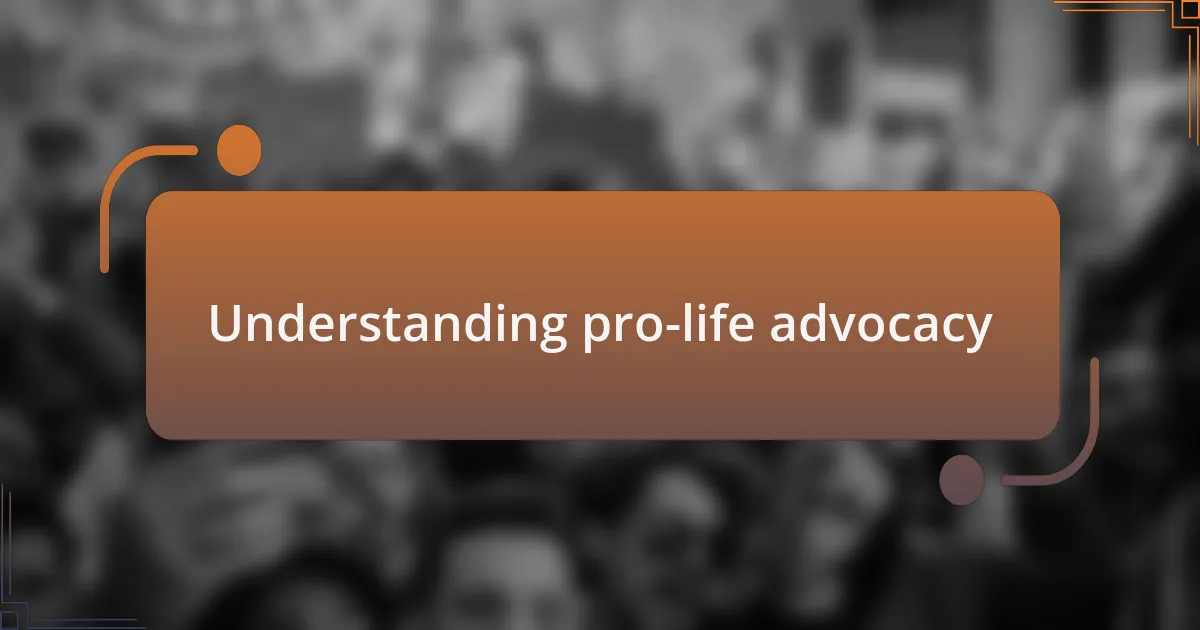
Understanding pro-life advocacy
Pro-life advocacy is deeply rooted in the belief that every human life has inherent value, beginning at conception. When I first engaged with this movement, I was struck by the passionate stories shared by advocates who had often faced difficult choices themselves. Have you ever considered how personal experiences can shape one’s convictions? For many, a single moment can ignite a lifelong commitment to protecting the most vulnerable.
At its core, pro-life advocacy emphasizes compassion and understanding, not just for unborn children but also for their families. I vividly recall attending a rally where a young woman shared her story of choosing life despite overwhelming circumstances. Listening to her made me realize that every decision is complex and multifaceted—how can we better support those in similar situations? It’s this very question that fuels ongoing dialogue within the movement, encouraging a compassionate approach to advocacy.
Furthermore, pro-life advocacy is not merely about opposition; it’s about promoting a culture of life. I’ve learned that helping people understand the importance of resources, education, and support can sometimes change hearts and minds more effectively than confrontation. How do we ignite awareness and empathy in a society often polarized by this issue? I believe that fostering open conversations is essential in bridging gaps and building a supportive community for all involved.
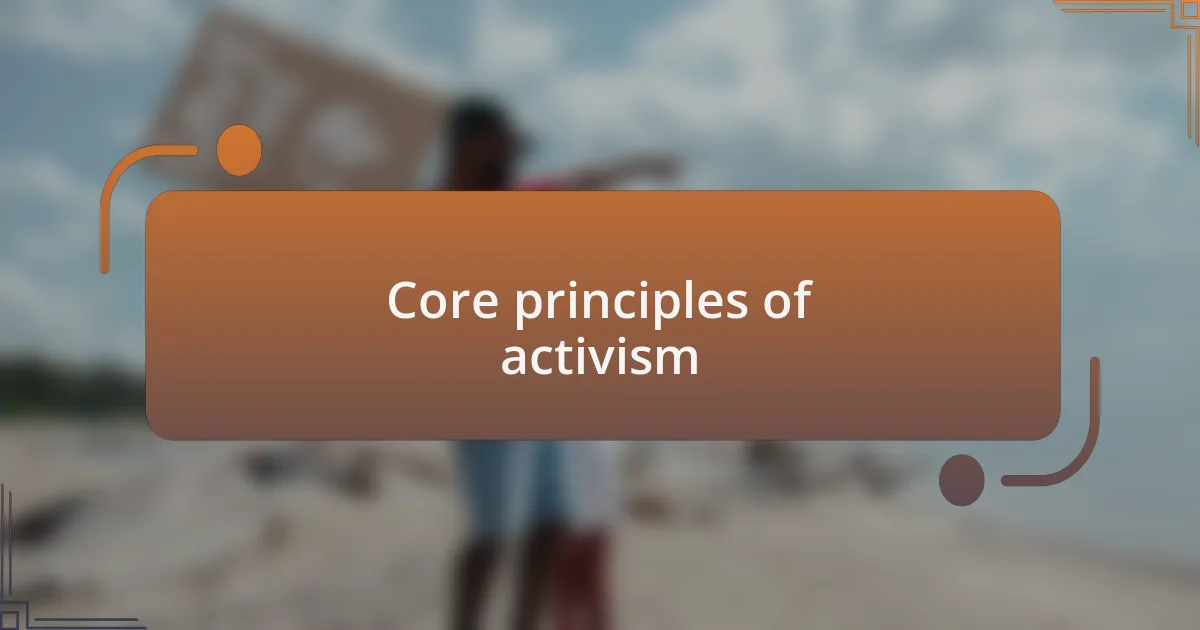
Core principles of activism
Core principles of activism revolve around clarity of purpose and a strong moral foundation. I’ve found that defining the core message can help galvanize support and create a unified front. For instance, during my early days in activism, I witnessed how a clear, consistent message energized a community rally, bringing together individuals from diverse backgrounds who shared a common goal. Have you ever experienced the power of unified voices?
Another principle is the importance of empathy in advocacy. I remember a time when I heard an outspoken opponent share their perspective at a town hall meeting. Instead of responding defensively, I chose to listen deeply, discovering that understanding their fears humanized our dialogue. In moments like these, I realized that true activism must foster connections rather than deepen divides. What happens when we genuinely seek to understand each other?
Furthermore, activism often thrives on action combined with education. I once organized a workshop where mothers facing tough choices could come together and learn about available resources. The experience reminded me that knowledge empowers individuals, shifting the conversation from mere opposition to informed support. How can we create spaces that educate and inspire action, rather than just debate? Embracing education can be a pathway to meaningful change, and I believe it can turn activism from a passive stance into a dynamic force for good.
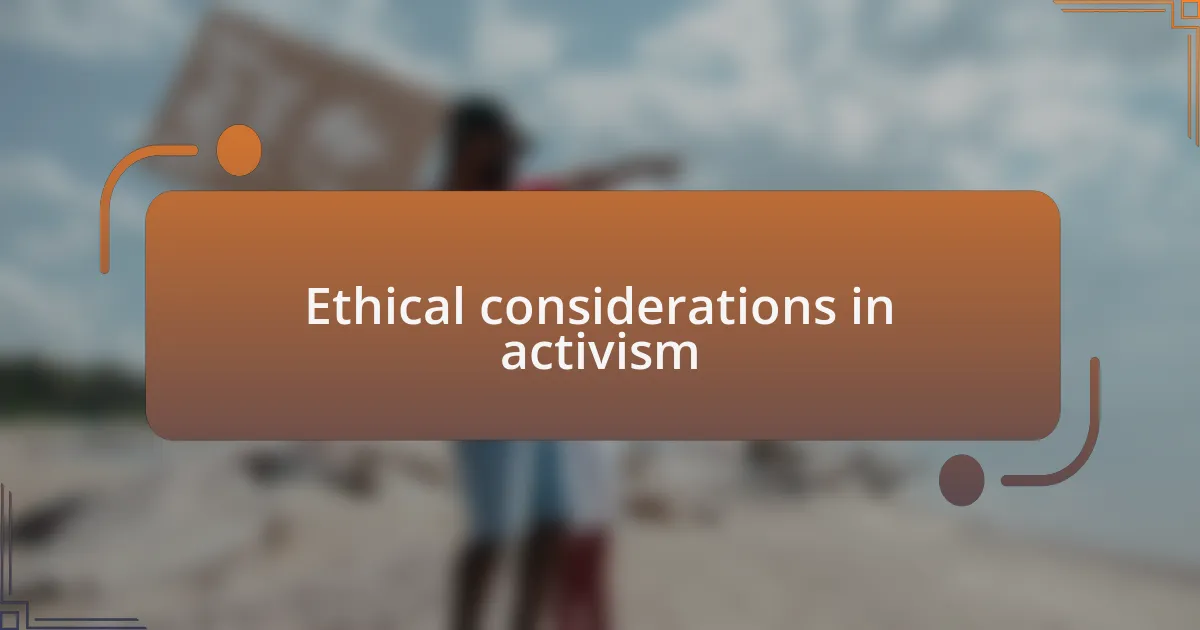
Ethical considerations in activism
When I think about the ethical considerations in activism, I’m reminded of a powerful lesson from a community event I attended. Someone shared their experience of feeling pressured to conform in the pro-life movement, and it struck a chord with me. It’s essential that as activists, we create space for diverse narratives, respecting individual journeys while advocating for our beliefs. Have you ever felt torn between group expectations and personal conviction?
The balance of passion and responsibility is another crucial ethical consideration. I recall a campaign where passionate messages were met with backlash because they lacked sensitivity to those in difficult circumstances. This taught me that advocacy should prioritize compassion, recognizing that our fervor must be tempered with understanding and respect for those we aim to support. How can we ensure our voices uplift rather than alienate?
Moreover, accountability plays a significant role in ethical activism. I remember being part of a panel discussion where we openly addressed our mistakes and learned from each other’s experiences. This transparency not only strengthened our credibility but also reminded us that growth comes from acknowledging flaws. Isn’t it vital for activists to be honest about their journey and encourage others to do the same? Through accountability, we can build trust and foster a culture of genuine dialogue.
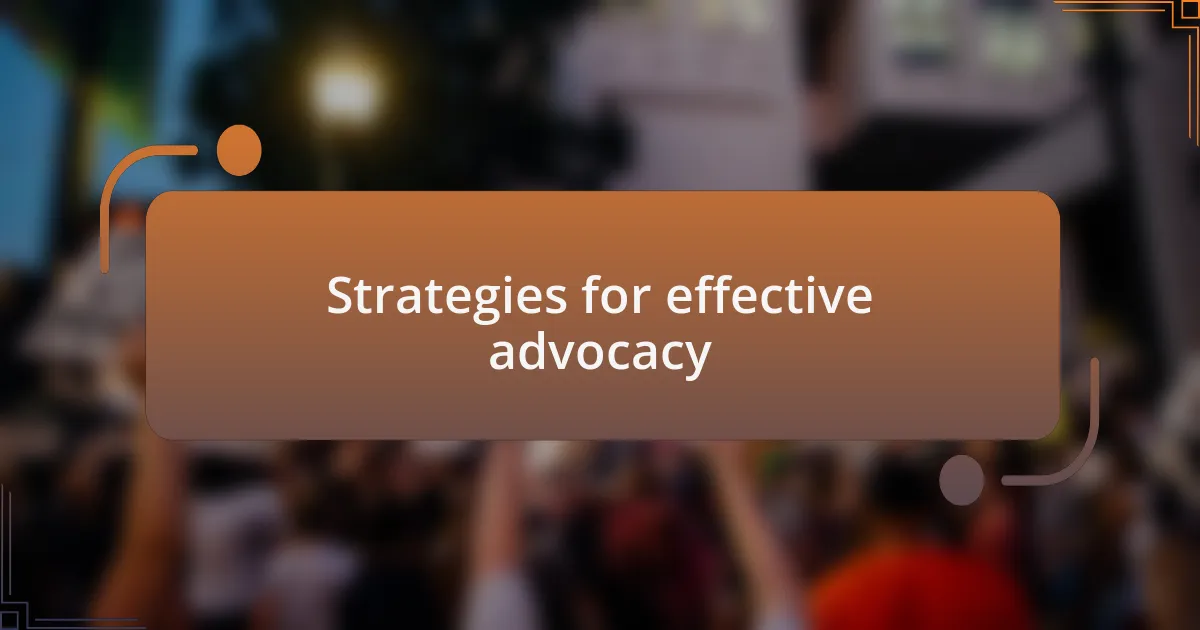
Strategies for effective advocacy
Effective advocacy hinges on clear communication. I recall a time when I prepared a presentation for a local community group. The impact was immediate when I focused on storytelling rather than statistics; sharing real-life experiences resonated deeply with attendees. Have you noticed how personal narratives can break down barriers and spark meaningful conversations?
Building alliances is another crucial strategy. I once collaborated with organizations outside the traditional pro-life sphere, and it opened my eyes to different perspectives that enriched our advocacy efforts. This cooperative approach fostered mutual respect and strengthened our message. How might your advocacy expand by reaching out to voices that might seem unrelated at first?
Lastly, understanding your audience can’t be overstated. During a campaign, I took the time to listen to the varied concerns of individuals over coffee instead of delivering a monologue. This simple act transformed our relationship; it turned a skeptical crowd into engaged allies. What strategies have you employed to connect authentically with those you seek to influence?
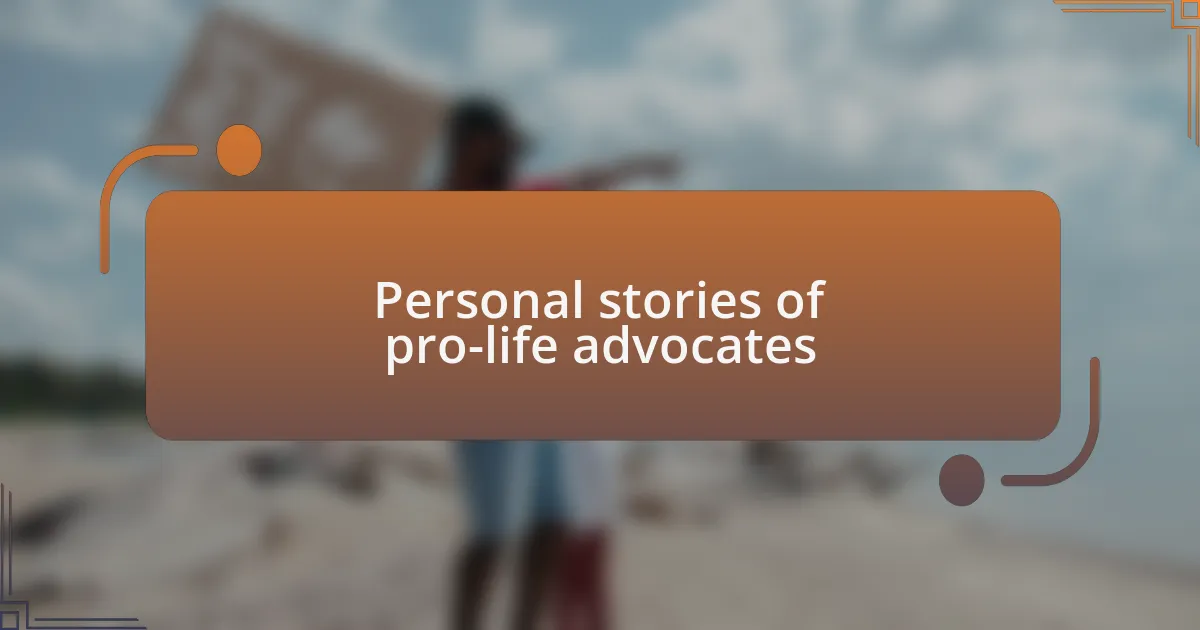
Personal stories of pro-life advocates
As a pro-life advocate, I’ve met individuals whose personal journeys inspired me profoundly. One woman shared how she chose life for her child despite facing overwhelming challenges. Her story was not just about her decision; it was a testament to resilience and hope, reminding me why our work matters. Have you ever connected with someone whose experience changed your outlook?
I remember attending a vigil where a father spoke about losing a child to abortion. His vulnerability opened the floodgates of emotion for everyone present. Witnessing his pain transformed my understanding of the issue; it was no longer just a debate but a matter of real lives impacted. Isn’t it fascinating how a single story can shift our perspective profoundly?
Another advocate I know started her journey in college when she encountered misinformation about pregnancy options. Instead of arguing, she invited peers to share their thoughts over lunch. That simple gesture turned into deep discussions that altered many lives, including her own. How often do we seize the moment to invite conversation, rather than just presenting our case?
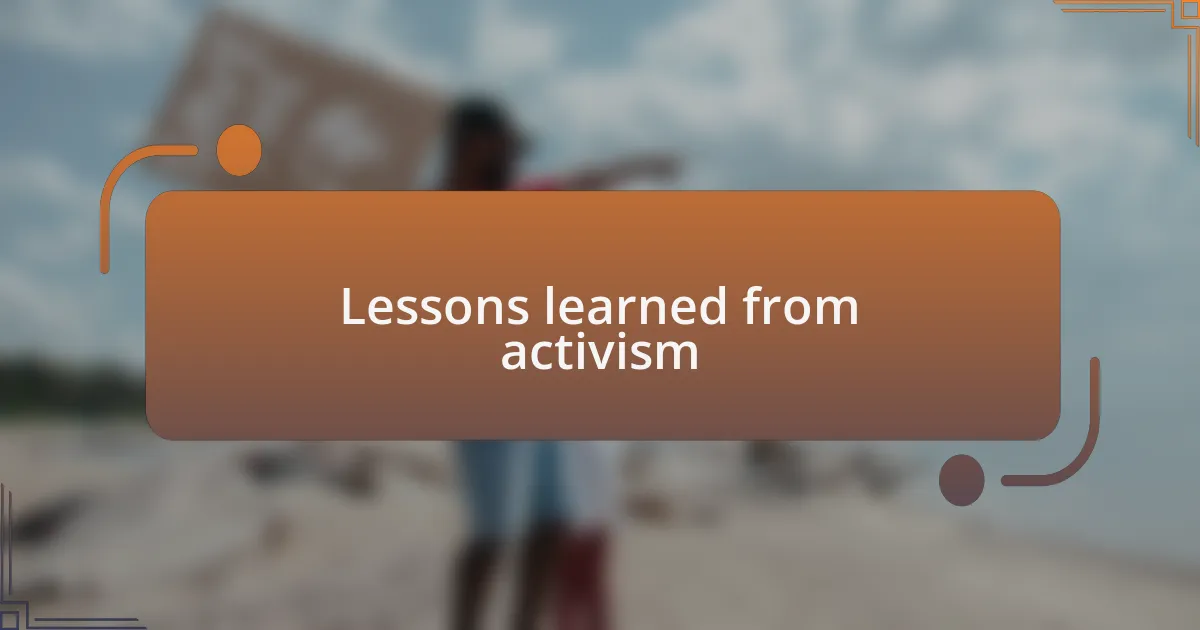
Lessons learned from activism
Activism has taught me that engagement is key to change. I once volunteered at a local library where I set up informational booths about pro-life resources. Surprisingly, I discovered that most attendees weren’t just curious; they were open to talking. This experience underscored the importance of creating spaces for dialogue rather than just presenting facts.
Another lesson I’ve learned is the power of community. I attended a workshop that focused on building networks among advocates. Hearing from others about their unique experiences and struggles gave me a renewed sense of purpose. It reminded me that we’re not alone in this fight. Isn’t it incredible how shared stories can forge stronger bonds among us?
I’ve also come to realize that activism requires a balance of passion and patience. During a rally, I encountered a skeptic who challenged my views. Instead of reacting defensively, I chose to listen. This interaction taught me that patience in discourse can lead to understanding rather than division. How often do we take the time to truly listen, rather than respond?
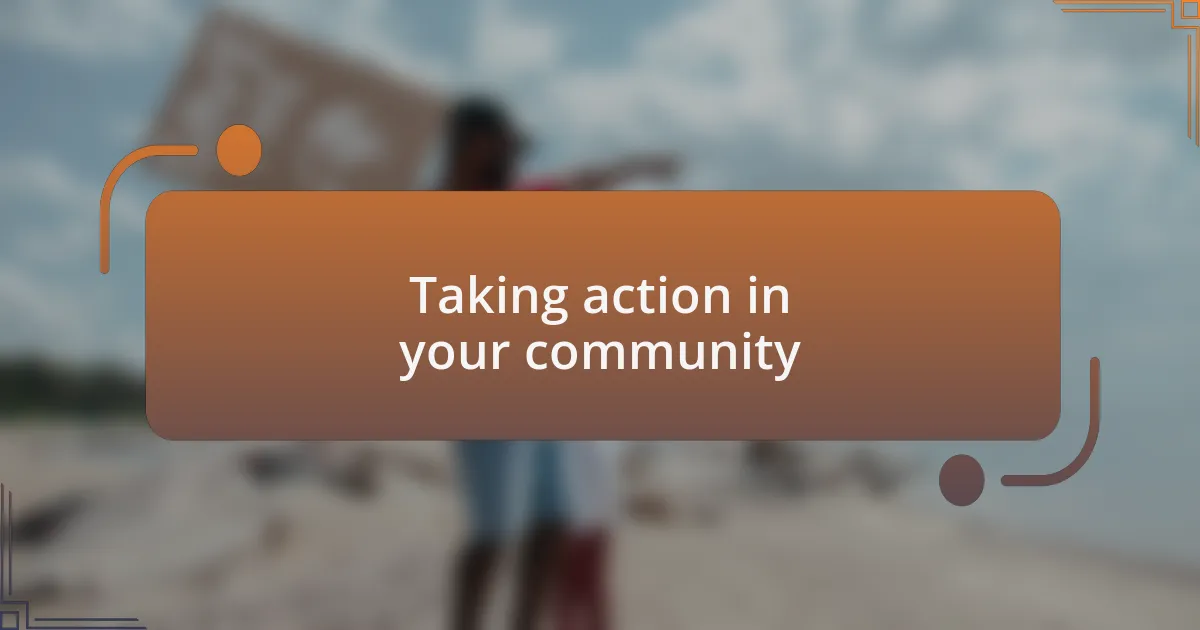
Taking action in your community
Taking action in your community is about identifying opportunities to make a difference right where you live. I remember organizing a small gathering in my neighborhood to discuss the pro-life stance with friends and family. It was incredible to see how many people were eager to participate and share their thoughts, creating a sense of community for those who may have felt isolated in their beliefs.
At times, I’ve found that simple actions can lead to significant impacts. I once participated in a local march, and it was heartwarming to connect with others who were equally passionate about the cause. Every banner we carried and every story shared fostered a sense of unity—reminding me that our collective voice is powerful. Have you ever experienced a moment where you felt part of something bigger than yourself?
Sometimes, taking action means stepping out of your comfort zone. Hosting workshops or inviting speakers to share their insights can make a world of difference. I experimented with a panel discussion that brought diverse viewpoints together, and I was amazed at how engaging those conversations were. It made me realize that every effort, no matter how small, fosters understanding and can ignite change within our communities. What lasting impact can you create through your own initiatives?